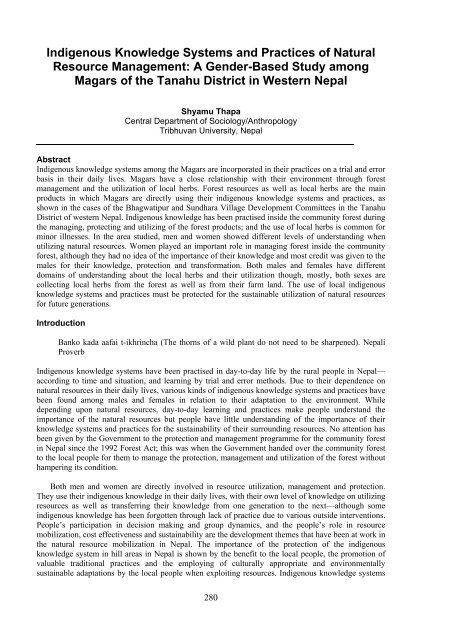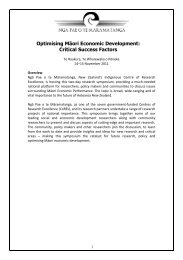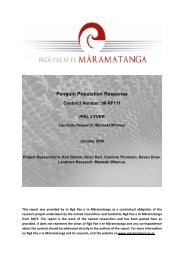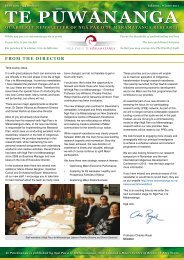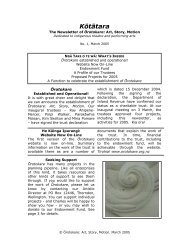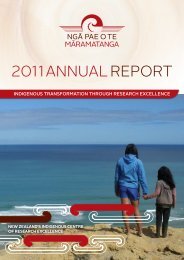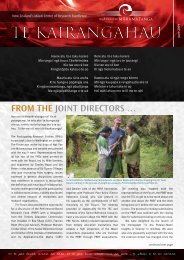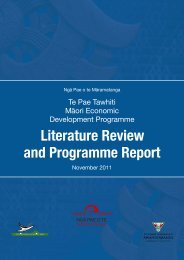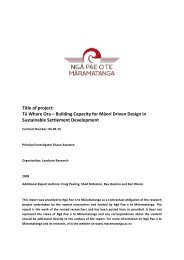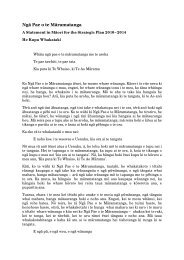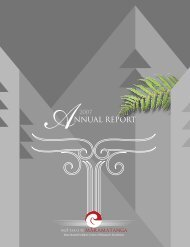traditional knowledge conference 2008 te tatau pounamu
traditional knowledge conference 2008 te tatau pounamu
traditional knowledge conference 2008 te tatau pounamu
You also want an ePaper? Increase the reach of your titles
YUMPU automatically turns print PDFs into web optimized ePapers that Google loves.
Indigenous Knowledge Sys<strong>te</strong>ms and Practices of NaturalResource Management: A Gender-Based Study amongMagars of the Tanahu District in Wes<strong>te</strong>rn NepalShyamu ThapaCentral Department of Sociology/AnthropologyTribhuvan University, NepalAbstractIndigenous <strong>knowledge</strong> sys<strong>te</strong>ms among the Magars are incorpora<strong>te</strong>d in their practices on a trial and errorbasis in their daily lives. Magars have a close relationship with their environment through forestmanagement and the utilization of local herbs. Forest resources as well as local herbs are the mainproducts in which Magars are directly using their indigenous <strong>knowledge</strong> sys<strong>te</strong>ms and practices, asshown in the cases of the Bhagwatipur and Sundhara Village Development Commit<strong>te</strong>es in the TanahuDistrict of wes<strong>te</strong>rn Nepal. Indigenous <strong>knowledge</strong> has been practised inside the community forest duringthe managing, pro<strong>te</strong>cting and utilizing of the forest products; and the use of local herbs is common forminor illnesses. In the area studied, men and women showed different levels of understanding whenutilizing natural resources. Women played an important role in managing forest inside the communityforest, although they had no idea of the importance of their <strong>knowledge</strong> and most credit was given to themales for their <strong>knowledge</strong>, pro<strong>te</strong>ction and transformation. Both males and females have differentdomains of understanding about the local herbs and their utilization though, mostly, both sexes arecollecting local herbs from the forest as well as from their farm land. The use of local indigenous<strong>knowledge</strong> sys<strong>te</strong>ms and practices must be pro<strong>te</strong>c<strong>te</strong>d for the sustainable utilization of natural resourcesfor future generations.IntroductionBanko kada aafai t-ikhrincha (The thorns of a wild plant do not need to be sharpened). NepaliProverbIndigenous <strong>knowledge</strong> sys<strong>te</strong>ms have been practised in day-to-day life by the rural people in Nepal—according to time and situation, and learning by trial and error methods. Due to their dependence onnatural resources in their daily lives, various kinds of indigenous <strong>knowledge</strong> sys<strong>te</strong>ms and practices havebeen found among males and females in relation to their adaptation to the environment. Whiledepending upon natural resources, day-to-day learning and practices make people understand theimportance of the natural resources but people have little understanding of the importance of their<strong>knowledge</strong> sys<strong>te</strong>ms and practices for the sustainability of their surrounding resources. No at<strong>te</strong>ntion hasbeen given by the Government to the pro<strong>te</strong>ction and management programme for the community forestin Nepal since the 1992 Forest Act; this was when the Government handed over the community forestto the local people for them to manage the pro<strong>te</strong>ction, management and utilization of the forest withouthampering its condition.Both men and women are directly involved in resource utilization, management and pro<strong>te</strong>ction.They use their indigenous <strong>knowledge</strong> in their daily lives, with their own level of <strong>knowledge</strong> on utilizingresources as well as transferring their <strong>knowledge</strong> from one generation to the next—although someindigenous <strong>knowledge</strong> has been forgot<strong>te</strong>n through lack of practice due to various outside in<strong>te</strong>rventions.People’s participation in decision making and group dynamics, and the people’s role in resourcemobilization, cost effectiveness and sustainability are the development themes that have been at work inthe natural resource mobilization in Nepal. The importance of the pro<strong>te</strong>ction of the indigenous<strong>knowledge</strong> sys<strong>te</strong>m in hill areas in Nepal is shown by the benefit to the local people, the promotion ofvaluable <strong>traditional</strong> practices and the employing of culturally appropria<strong>te</strong> and environmentallysustainable adaptations by the local people when exploiting resources. Indigenous <strong>knowledge</strong> sys<strong>te</strong>ms280


